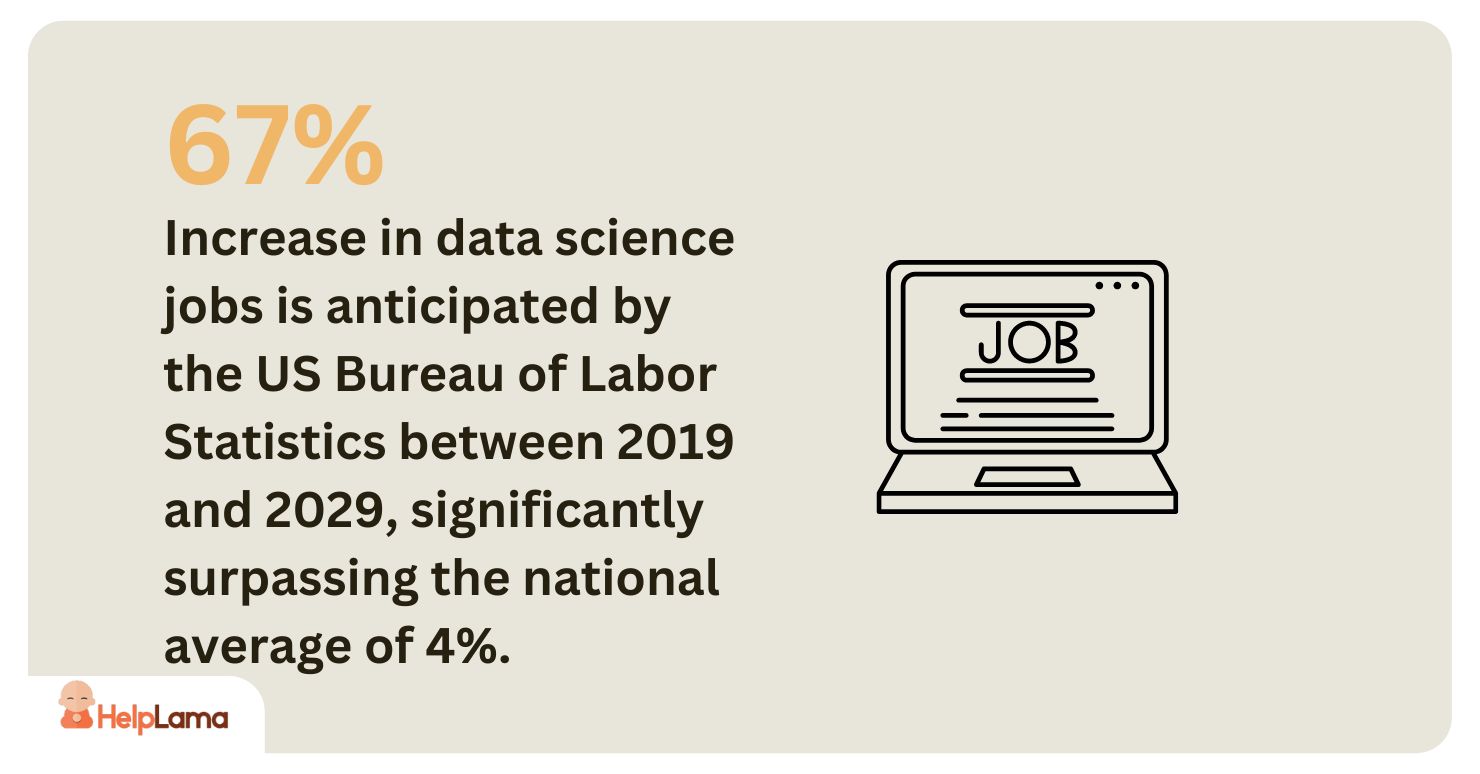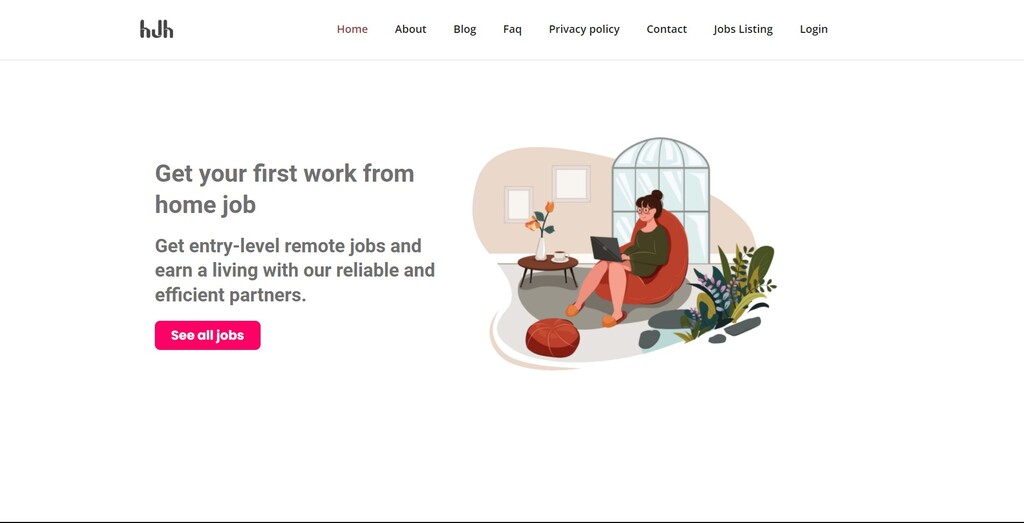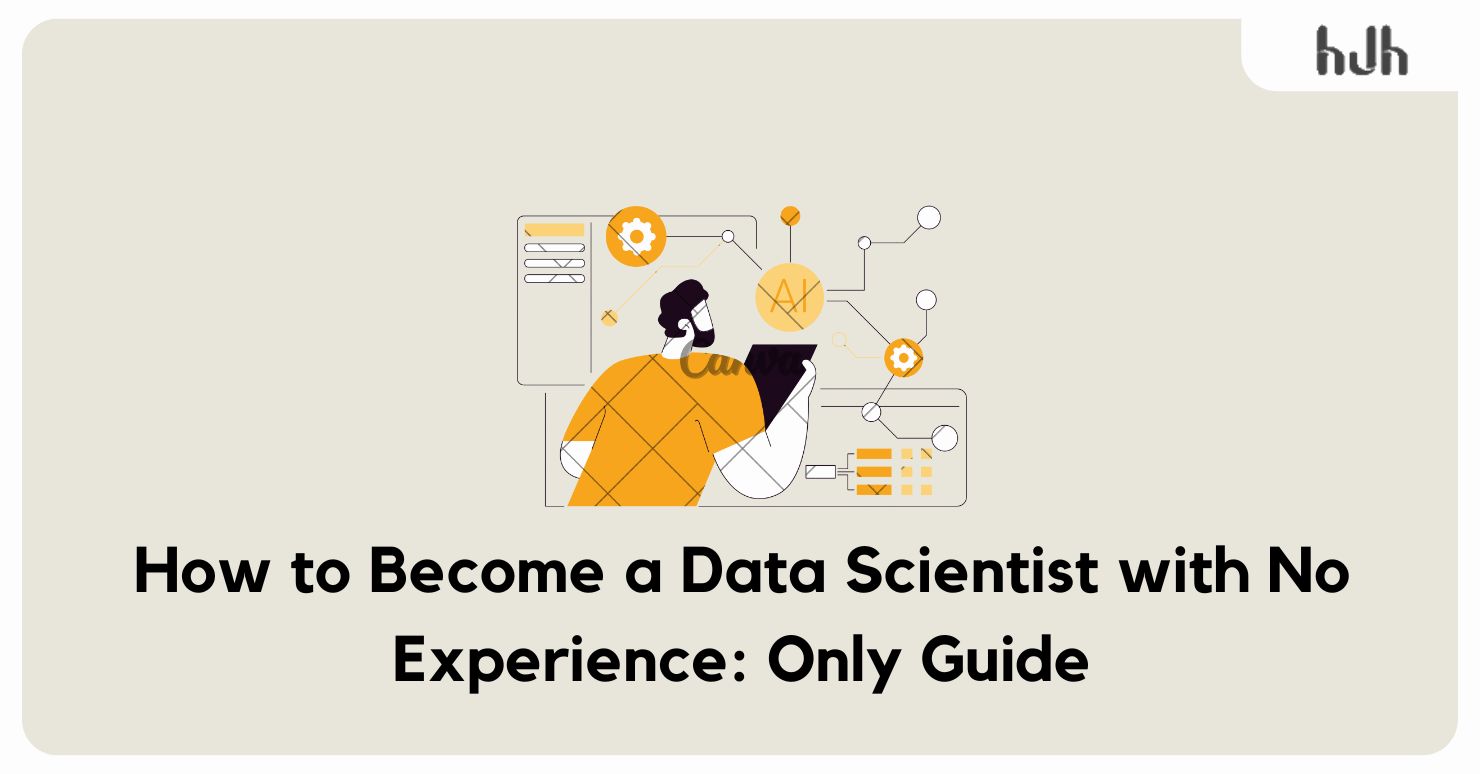Are you looking for how to become a data scientist with no experience, but overwhelmed by the industry’s demand for skilled professionals?
According to data science statistics, despite the prominence of big data and data science, 60% of companies struggle to find qualified data scientists due to a talent shortage. But fret not! Our comprehensive guide is here to help you navigate the path to becoming a proficient data scientist, even if you’re starting from scratch
What is a Data Scientist?
In the realm of modern analytics, you’re the detective deciphering the mysteries hidden within data. As a data scientist, you wield statistical prowess, machine learning expertise, and programming skills to extract insights from complex datasets. Your role is pivotal in guiding organizations toward informed decisions, process enhancements, and innovation through data-driven strategies.
What Are The Qualifications Required To Become a Data Scientist?
When considering your path to becoming a data scientist, it’s crucial to understand the qualifications needed for success. Research indicates that 91% of data scientists have pursued some form of higher education. Among employed professionals in the field, common degrees include:
- Data Science (21%)
- Computer Science (18.3%)
- Statistics or Maths (16.3%)
- Economics, and Social Sciences (12.3%)
- Others (32.1%)
While obtaining a degree is a typical route into the field, don’t be disheartened if that’s not currently feasible for you. The demand for data scientists is booming, with a projected increase of 27.9% in job opportunities from 2016 to 2026.
In a study of 1,000 data scientists, It was found that higher education is almost universally completed by professionals in the field. However, there’s a rising trend of employers valuing practical skills over formal education. This means that having the necessary theoretical understanding and practical capabilities is essential for success in data science.
So, before diving into the question of how to kickstart a career in data science with no experience, ensure you equip yourself with the required knowledge and skills.
Exploring the Path of Non-Formal Education
Embarking on a journey to becoming a data scientist doesn’t always require a traditional university degree. You can achieve success through alternative paths, such as online courses and self-study. Here’s a guide to help you navigate this non-formal education route:
Understanding the Data Science Landscape
Start by gaining a comprehensive understanding of the data science field and its significance in business operations. Learn about key terms, data analysis techniques, and the role of data in driving company growth and profitability.
Building a Foundation
Begin your learning journey by focusing on foundational subjects like Statistics, Mathematics, and Probability. These disciplines lay the groundwork for understanding technical concepts and frameworks essential to data science.
Mastering Coding Skills
Coding proficiency is crucial for a data scientist. Start with learning SQL for working with databases and Python for data manipulation and analysis. Take beginner-level programming courses and practice coding through simple projects to solidify your skills.
Exploring Advanced Topics
Delve into advanced topics like machine learning algorithms, including supervised and unsupervised learning, as well as deep learning techniques. Continuously challenge yourself to deepen your understanding and explore new concepts.
Data Visualization Proficiency
Enhance your ability to communicate insights effectively through data visualization. Learn techniques to create visually appealing and informative data visualizations that convey complex information.
By following these steps and continuously expanding your knowledge and skills, you can pave the way for a successful career in data science, even without a traditional degree.
Is a Degree In Computer Science Necessary To Pursue a Career as a Data Scientist?
No, a Computer Science degree is not a strict requirement to become a data scientist. While many job postings may prefer candidates with advanced degrees in engineering, computer science, mathematics, or statistics, data science is open to individuals with diverse backgrounds. Companies facing a shortage of data science talent are increasingly willing to consider non-traditional applicants.
Major players in the industry, such as Google, Apple, and IBM, have even relaxed their requirements and no longer mandate college degrees for applicants. There are numerous entry-level positions available for those who possess the necessary practical knowledge and experience, as outlined in the job descriptions.
For individuals interested in pursuing a career in data science without a degree, there are various avenues to acquire the requisite skills. Online courses, certification programs, and self-study resources, including videos and modules, offer opportunities to gain expertise and enhance job prospects. Many successful data professionals have launched their careers through such alternative pathways.
How To Become A Data Scientist With No Experience
To break into data science without prior experience, take proactive steps and showcase your enthusiasm. Embrace a positive mindset and demonstrate your eagerness for the role you’re pursuing. Below are our recommendations for initiating a career in data science without prior experience.
Craft an Impressive Resume
Begin by creating a standout resume that showcases your skills and project experience. Choose a suitable template and personalize it to reflect your professional image. For further assistance, refer to our comprehensive resume-building guide.
Develop an Outstanding Portfolio
Demonstrate your abilities to prospective employers by building a compelling portfolio showcasing your projects. Ensure it is well-organized and presents your work professionally. Additionally, host your projects on platforms like GitHub for easy access and review by hiring managers.
Develop Industry-Relevant Projects
Building a portfolio solely from academic projects won’t set you apart in the competitive field of data science. Follow our detailed guide on crafting a standout portfolio, covering project ideas, portfolio creation, and navigating platforms like Kaggle. Additionally, consider selecting projects aligned with your desired industry to demonstrate your commitment and passion.
Here’s an extra tip:
Tailor your projects to the field you’re interested in, utilizing relevant datasets or collecting your data. This initiative showcases your dedication and willingness to go the extra mile, qualities highly valued by employers.
Networking for Success
Networking is essential in the data science realm, providing invaluable insights, support, and potential job opportunities. Engage with professionals through social media, online forums, and industry events to immerse yourself in the data science community. By connecting with experienced individuals, you gain valuable knowledge, confidence, and potentially even job referrals. Don’t underestimate the power of networking in kickstarting your data science career.
Approach Employers
Engaging directly with potential employers can significantly enhance your job search strategy. Here’s how to effectively approach employers to increase your chances of landing a data science job:
- Research: Before reaching out, thoroughly research the company to understand its industry, products, and recent projects. Tailor your approach to highlight how your skills align with their needs.
- Personalize Your Outreach: Avoid generic messages and tailor each communication to the specific company and role. Highlight your relevant skills, experiences, and how you can contribute to their team.
- Utilize LinkedIn: LinkedIn is a powerful tool for networking and job hunting. Connect with employees or recruiters at your target companies, and engage with their content to build rapport.
- Attend Industry Events: Attend industry conferences, workshops, and networking events to meet professionals from your target companies. These events provide valuable opportunities to make personal connections and learn about potential job openings.
- Follow-up: After reaching out, follow up with a thank-you email or message to express your continued interest in the company. Persistence and professionalism can leave a positive impression on employers.
By proactively approaching employers and showcasing your enthusiasm and qualifications, you can increase your visibility and likelihood of securing a data science position.
Explore Remote Data Science Opportunities
- Remote-Friendly Companies: Research companies known for offering remote data science positions.
- Remote Job Platforms: Use dedicated remote job platforms like Remote.co and We Work Remotely to find opportunities.
- Filter Search Results: Narrow down your search based on remote work preferences and job requirements.
- Tailor Your Application: Customize your resume and cover letter to showcase your remote work skills and experience.
- Network: Connect with professionals in remote data science roles through online communities and LinkedIn.
- Remote Interviews: Prepare for remote interviews by familiarizing yourself with virtual interview platforms and practicing effective communication.
By considering remote work options, you can expand your job search and access opportunities beyond your local area.
Establishing Your Personal Brand
Establishing your brand is essential in today’s competitive landscape. By making yourself easily recognizable and discoverable, you can position yourself as an authority in your field. Start by creating a blog to showcase your expertise and demonstrate your passion for continuous learning and growth.
Engage with industry professionals on social media platforms like LinkedIn to expand your network and share valuable insights. Consistent content creation and active participation will help you build meaningful connections and establish yourself as a reputable figure in the industry.
Future Of Data Science
It comes as no surprise that companies are undergoing a revolution thanks to data. The global Big Data as a Service (BDaaS) market is projected to surge from $11.3 billion in 2019 to $42.7 billion by 2024. While numerous factors contribute to this expansion, we’ve selected the top five to illustrate how data science in business is poised to reshape the future.
Guides Business Decisions
Netflix’s extensive Christmas content release in 2020 exemplifies the power of data-driven decision-making. Through data analysis of user behavior, Netflix tailors its content to meet audience preferences, driving both content creation and marketing strategies.
Shapes Goal Setting
Airlines leveraging big data to achieve eco-friendliness illustrate the role of data science in defining and quantifying goals. Whether it’s fuel efficiency, reduced emissions, or technological advancements, data scientists help set clear and achievable objectives.
Reveals Untapped Opportunities
Companies like Viacom18 utilize data science to identify growth opportunities and streamline operations. By analyzing data and setting new objectives, organizations can optimize their strategies and capitalize on previously unseen potential.
Enables Evidence-Based Decisions
Partnerships like IBM and Vodafone Idea’s collaboration demonstrate the impact of data science on decision-making. Through data analysis, companies gain actionable insights that inform strategic and operational decisions, enhancing customer service and overall performance.
Facilitates Iterative Improvement
In the realm of online education, data science plays a vital role in course design and optimization. By analyzing student data, educational platforms refine course offerings to better meet student needs, exemplifying the iterative nature of data-driven decision-making in improving outcomes.

Explore Remote Career Opportunities with 10xhire.io: Your Gateway to Remote Job Market
10xhire.io is a reliable platform tailored for individuals seeking remote job opportunities. Whether you’re exploring remote work for the first time or aiming to expand your existing remote career, it provides a curated list of remote job openings across various industries.
With user-friendly search features and personalized job alerts, 10xhire.io simplifies the process of finding and applying for remote positions that align with your skills and preferences. Dive into the world of remote work with 10xhire.io and discover your next career opportunity from the comfort of your home.

Key Features
- Comprehensive Job Listings: Access a diverse range of remote job opportunities from various industries and sectors.
- Advanced Search Filters: Refine job searches based on criteria such as job title, location, company, industry, and more to find the perfect match.
- Personalized Job Alerts: Receive customized notifications for new job listings that match your preferences and skills.
- User-Friendly Interface: Navigate the platform effortlessly with an intuitive and easy-to-use interface.
- Resume Building Tools: Create and upload professional resumes to streamline the application process.
- Application Tracking: Keep track of job applications and their status directly on the platform.
- Career Resources: Access guides, articles, and tips on remote work, career development, and job search strategies.
Final Words
In conclusion, breaking into data science without prior experience is challenging but entirely feasible with the right approach. By leveraging self-learning resources, building a strong portfolio, networking with professionals, and demonstrating a proactive attitude, you can overcome the barriers and embark on a successful career journey in data science.
Remember, while the path may be challenging, dedication, perseverance, and continuous learning are key to achieving your goal of becoming a data scientist, even without prior experience.




